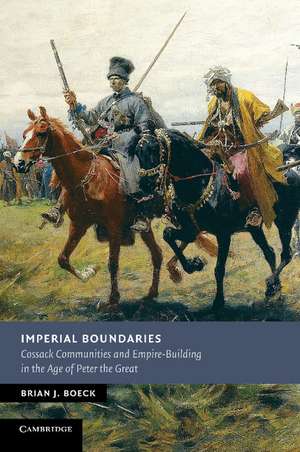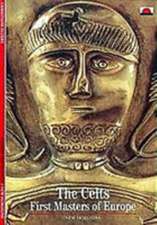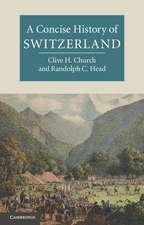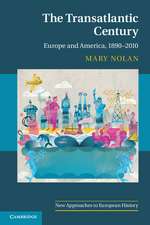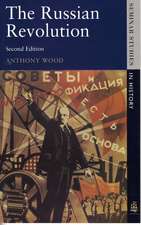Imperial Boundaries: Cossack Communities and Empire-Building in the Age of Peter the Great: New Studies in European History
Autor Brian J. Boecken Limba Engleză Paperback – 29 ian 2014
| Toate formatele și edițiile | Preț | Express |
|---|---|---|
| Paperback (1) | 285.54 lei 6-8 săpt. | |
| Cambridge University Press – 29 ian 2014 | 285.54 lei 6-8 săpt. | |
| Hardback (1) | 695.93 lei 6-8 săpt. | |
| Cambridge University Press – 30 sep 2009 | 695.93 lei 6-8 săpt. |
Din seria New Studies in European History
-
 Preț: 238.02 lei
Preț: 238.02 lei -
 Preț: 237.92 lei
Preț: 237.92 lei -
 Preț: 208.49 lei
Preț: 208.49 lei - 9%
 Preț: 593.70 lei
Preț: 593.70 lei -
 Preț: 398.41 lei
Preț: 398.41 lei -
 Preț: 177.91 lei
Preț: 177.91 lei -
 Preț: 211.13 lei
Preț: 211.13 lei - 9%
 Preț: 592.60 lei
Preț: 592.60 lei -
 Preț: 169.70 lei
Preț: 169.70 lei -
 Preț: 166.99 lei
Preț: 166.99 lei -
 Preț: 266.53 lei
Preț: 266.53 lei -
 Preț: 241.90 lei
Preț: 241.90 lei -
 Preț: 429.99 lei
Preț: 429.99 lei -
 Preț: 400.05 lei
Preț: 400.05 lei - 11%
 Preț: 698.50 lei
Preț: 698.50 lei -
 Preț: 275.85 lei
Preț: 275.85 lei -
 Preț: 330.09 lei
Preț: 330.09 lei - 11%
 Preț: 695.93 lei
Preț: 695.93 lei -
 Preț: 423.10 lei
Preț: 423.10 lei -
 Preț: 340.13 lei
Preț: 340.13 lei - 11%
 Preț: 698.30 lei
Preț: 698.30 lei -
 Preț: 326.82 lei
Preț: 326.82 lei -
 Preț: 339.37 lei
Preț: 339.37 lei -
 Preț: 396.59 lei
Preț: 396.59 lei -
 Preț: 383.48 lei
Preț: 383.48 lei -
 Preț: 292.40 lei
Preț: 292.40 lei - 14%
 Preț: 682.94 lei
Preț: 682.94 lei -
 Preț: 282.75 lei
Preț: 282.75 lei -
 Preț: 417.07 lei
Preț: 417.07 lei -
 Preț: 437.18 lei
Preț: 437.18 lei - 14%
 Preț: 873.67 lei
Preț: 873.67 lei -
 Preț: 420.40 lei
Preț: 420.40 lei -
 Preț: 319.99 lei
Preț: 319.99 lei - 14%
 Preț: 687.39 lei
Preț: 687.39 lei -
 Preț: 397.01 lei
Preț: 397.01 lei - 11%
 Preț: 695.93 lei
Preț: 695.93 lei - 11%
 Preț: 543.84 lei
Preț: 543.84 lei
Preț: 285.54 lei
Nou
Puncte Express: 428
Preț estimativ în valută:
54.64€ • 57.05$ • 45.22£
54.64€ • 57.05$ • 45.22£
Carte tipărită la comandă
Livrare economică 04-18 aprilie
Preluare comenzi: 021 569.72.76
Specificații
ISBN-13: 9781107695016
ISBN-10: 1107695015
Pagini: 270
Dimensiuni: 152 x 229 x 15 mm
Greutate: 0.4 kg
Editura: Cambridge University Press
Colecția Cambridge University Press
Seria New Studies in European History
Locul publicării:New York, United States
ISBN-10: 1107695015
Pagini: 270
Dimensiuni: 152 x 229 x 15 mm
Greutate: 0.4 kg
Editura: Cambridge University Press
Colecția Cambridge University Press
Seria New Studies in European History
Locul publicării:New York, United States
Cuprins
Introduction; 1. Beyond borders, between worlds: Russian Empire and the making of the Don Steppe Frontier; 2. People and power on the frontier: liberty, diversity, and de-centralization in the Don region to 1700; 3. A middle ground between autonomy and dependence: the raiding economy of the Don Steppe Frontier to 1700; 4. Boundaries of integration or exclusion? Migration, mobility, and state sovereignty on the southern Frontier to 1700; 5. Testing the boundaries of imperial alliance: co-operation, negotiation and resistance in the era of Razin (1667–81); 6. Between Rus' and Rossiia: realigning the boundaries of Cossack communities in a time of migration and transition (1681–95); 7. The era of Raskol: religion and rebellion (1681–95); 8. Incorporation without integration: the Azov Interlude (1695–1711); 9. From frontier to borderland: the demarcation of the Steppe and the delegitimation of raiding (1696–1710); 10. Boundaries of land, liberty, and identity: making the Don region legible to imperial officials (1696–1706); 11. The Bulavin uprising: the last stand of the old Steppe (1706–9); 12. Reshaping the Don in the imperial image: power, privilege, and patronage in the post-Bulavin era (1708–39); 13. Closing the Cossack community: recording and policing the boundaries of group identity (1708–39); 14. A borderline state of mind: the closing of the Don Steppe frontier (1708–39); Afterword.
Recenzii
'The book not only makes an important contribution to our understanding of Russia as empire, but also tells us much about a particular region and its population, especially about the shift of social identities in early modern Russia.' Guido Hausmann, H-HistGeog
Notă biografică
Descriere
A study of imperial expansion and local transformation on Russia's Don Steppe frontier during the age of Peter the Great.
